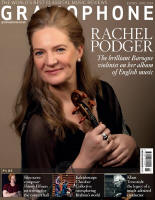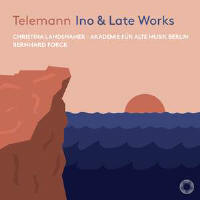Texte paru dans: / Appeared in:
|
|
|
|
|
|
These pieces are Telemann’s last known compositions. They show him to have been extraordinarily inventive into his 80s, knowledgeable about new musical styles right to the end. The magnificent D major Overture (orchestral suite) sees him at his very best, and for the cantata Ino no word other than ‘masterpiece’ will do. Both were recorded by Musica Antiqua Köln under Reinhard Goebel with Barbara Schlick as soloist in the cantata; these new interpretations add two slighter multimovement works also from this very late period.
Christina Landshamer is a sympathetic protagonist in Ino, her timbre fuller and more powerful than Schlick’s (who, on the other hand, is more agile and surer of intonation). Her characterisation is consequently the more overtly heroic of the two and lacks neither warmth nor eloquence, though Schlick better captures Ino’s vulnerability and is better supported by the ensemble in the cantata’s sudden changes of mood and the breathless intensity of Ino’s plight (as much ‘fight or flight’ as Sturm und Drang). Schlick’s cadenzas for the arias are also more developed and finely honed. The many instrumental interludes seem better integrated in Goebel’s reading.
The Akademie für Alte Musik give fine accounts of the instrumental works, but all the same, I prefer Goebel’s more contrasted choices of tempo in the Overture: between the slow introduction to the opening movement and the subsequent fast section, and between the ‘Plainte’ (which indeed sounds more languid) and the ‘Réjouissance’ that follows (and is marked très vite). Goebel’s winds are more incisive, too; in fact, the whole ensemble is lighter on its feet (compare them in the ‘fleeing’ instrumental episode before the arioso of Ino), whereas the double basses of the Berlin band can be overbearing (try the instrumental ‘outro’ to the cantata’s first aria).
The E flat major Divertimento and the Sinfonia melodica are slighter pieces, but as often happens with Telemann, they grow on you. Don’t hesitate to try this new recording, then, but if you’ve not heard this gorgeous music before, Goebel’s account has lost none of its zest and may still be the first port of call. |
|




